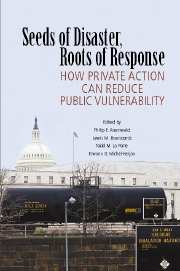Book contents
- Frontmatter
- Contents
- List of Contributors
- Foreword, by General Robert T. Marsh
- Preface
- Acknowledgments
- I SEEDS OF DISASTER
- II A CRITICAL CHALLENGE
- III MANAGING ORGANIZATIONS
- IV SECURING NETWORKS
- V CREATING MARKETS
- 17 Insurance, the 14th Critical Sector
- 18 National Security and Private-Sector Risk Management for Terrorism
- 19 Terrorism, Insurance, and Preparedness: Connecting the Dots
- 20 Looking Beyond TRIA: A Clinical Examination of Potential Terrorism Loss Sharing
- 21 Financing Catastrophe Risk with Public and Private (Re)insurance Resources
- VI BUILDING TRUST
- VII ROOTS OF RESPONSE
- References
- Contributors
- Author Index
- Subject Index
20 - Looking Beyond TRIA: A Clinical Examination of Potential Terrorism Loss Sharing
Published online by Cambridge University Press: 30 July 2009
- Frontmatter
- Contents
- List of Contributors
- Foreword, by General Robert T. Marsh
- Preface
- Acknowledgments
- I SEEDS OF DISASTER
- II A CRITICAL CHALLENGE
- III MANAGING ORGANIZATIONS
- IV SECURING NETWORKS
- V CREATING MARKETS
- 17 Insurance, the 14th Critical Sector
- 18 National Security and Private-Sector Risk Management for Terrorism
- 19 Terrorism, Insurance, and Preparedness: Connecting the Dots
- 20 Looking Beyond TRIA: A Clinical Examination of Potential Terrorism Loss Sharing
- 21 Financing Catastrophe Risk with Public and Private (Re)insurance Resources
- VI BUILDING TRUST
- VII ROOTS OF RESPONSE
- References
- Contributors
- Author Index
- Subject Index
Summary
The evolution of international terrorism is now well accepted. Still mainly organized as local political actions twenty years ago, it has continuously expanded to include a large portion of extremist religious and other groups seeking to inflict fear, mass-casualties, and maximum disruption to Western nations' social and economic continuity. Most of these groups operate internationally. Indeed, the world's 15 worst terrorist attacks (based on the number of casualties) all occurred after 1982, more than three-quarters of which took place between 1993 and 2005. A large portion of all terrorist attacks in the world during this period have been directed against U.S.-related interests and personnel. The Madrid train bombings on March 11, 2004, the coordinated London bus and underground bombings of July 7, 2005, and the bombings in Amman, Jordan, in November 2005 – attacks against three countries that were allies of the United States in the war in Iraq – suggest that the United States remains a principal target for several international terrorist groups adhering to al-Qaeda's ideology.
Although the United States has been successful since 9/11 in preventing terrorist attacks on its own soil, the impact to the economy of another mega-attack or series of coordinated attacks pose serious concerns to the government, the private sector, and citizenry (Kunreuther and Michel-Kerjan 2004, 2005). With security reinforced around federal buildings, the commercial sector constitutes a softer target for terrorist groups to inflict mass-casualties and stress on the nation.
- Type
- Chapter
- Information
- Seeds of Disaster, Roots of ResponseHow Private Action Can Reduce Public Vulnerability, pp. 338 - 378Publisher: Cambridge University PressPrint publication year: 2006



